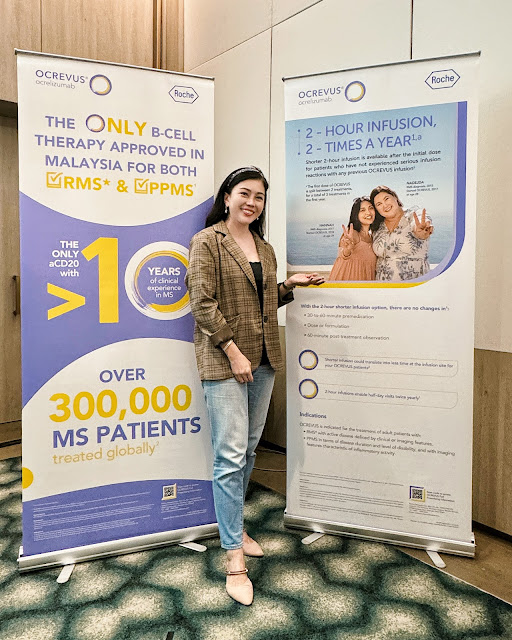Hey! Recently I attended a talk about Multiple sclerosis (MS). This is a neurological condition that affects the brain and spinal cord (the central nervous system) which control all bodily functions. MS damages the coating that protects the nerves or known as myelin. This loss of myelin or demyelination disrupts the ability of the nerves to conduct electrical impulses to and from the brain1.
As a result, people with MS can experience a varying range of symptoms. Rarely are two patients’ symptoms alike and symptoms can range from mild to debilitating. Symptoms can include blurred vision, dizziness, fatigue, numbness and tingling, muscle spasm, stiffness and limb weakness, mobility issues, speech difficulties, vertigo, pain, bowel or bladder problems and difficulty in swallowing1.
Roche
(Malaysia) Sdn. Bhd. announced the availability of OCREVUS®️ in Malaysia,
a twice-yearly convenient dosing option for the treatment of relapsing forms of
multiple sclerosis (RMS) and primary progressive multiple sclerosis (PPMS).
As
of 2020, MS affects 2.8 million people worldwide2. This equates to 1 in 3,000 people in
the world living with MS1. A higher prevalence is recorded in North
America, Europe, and parts of Australia with as many as 1 in every 300 people having
MS1.
Although
the prevalence of MS is lower in Asia1, symptoms suffered by patients are no
less severe than those in the West. In Malaysia, it is listed as a rare disease3
with an estimated prevalence of 6 per 100,000 population4.
OCREVUS®
Slowing Progression and Suppressing Relapses
Administered
by intravenous infusion every six months, OCREVUS® has shown sustained
high-efficacy to slow disease progression, thus positively impacting the
quality of life of MS patients.5 Data shows that 8 out of 10 RMS
patients are progression-free of their condition after 10 years.6
MS may be a rare disease but there is an urgent unmet need to improve the diagnosis, treatment and management of MS. Women account for 83% of the MS incidence in Malaysia7.
Understanding
MS
According
to Dr Low Soon Chai, a Consultant Neurologist, “Multiple sclerosis is a
life-long incurable condition. It is five times more common in women than in men8.”
 |
| Dr Low Soon Chai, Consultant Neurologist |
“The
disease is highly unpredictable. For some, it means going through phases of
getting better (remission) and then experiencing setbacks (relapse), while for
others, it follows a continuous worsening over time. Nonetheless, people with
all forms of MS experience disease activity such as inflammation in the nervous
system and permanent loss of nerve cells in the brain, even when their clinical
symptoms aren’t apparent or don’t appear to be getting worse.”
“The important goal when treating MS is to reduce disease activity as soon as possible to slow down the disability progression. If not well managed, individuals with severe multiple sclerosis may develop irreversible or complete disability,” Dr Low added.
 |
| Dr Chey Shin Yee, Consultant Neurologist |
Explaining
the different types of MS, Dr Chey Shin Yee, a Consultant Neurologist,
said, “MS includes individuals with relapsing-remitting MS (RRMS), which is the
most common type. People with RRMS experience episodes of relapses of
neurological symptoms, followed by periods of improvement or remission. An
episode can last for days or weeks and recovery could take weeks or months,
depending on the symptoms, with some patients never recovering fully from their
symptoms.”
“Over
time, some individuals with RRMS may transition to secondary progressive MS
(SPMS), where there is a gradual worsening of neurological function and
disability accumulation, even without relapses. This transition typically
occurs after many years of living with RRMS.”
“Primary
progressive multiple sclerosis (PPMS) is a rarer form of MS. Unlike
relapsing-remitting MS (RRMS), where individuals experience episodes of
worsening symptoms followed by periods of remission, PPMS is characterized by a
steady worsening of symptoms from the beginning, without distinct relapses or
remissions. People with advanced MS may have to rely on mobility aids or become
wheelchair bound and are unable to work and need carers to look after them
sooner,” Dr. Chey added.
Dr
Low and Dr Chey emphasized the importance to consult neurologists when
experiencing symptoms suggestive of MS for an accurate diagnosis and to rule
out other neurological conditions that may mimic MS.
En. Rizal Aminuddin, President of Multiple
Sclerosis Society of Malaysia (MSSM) and a caregiver, said, “We are indeed
pleased that Roche is collaborating with us to enhance national awareness for early
intervention, treatment and management to avoid progression of this
debilitating disease.”
“MSSM
believes in a holistic and innovative approach to MS treatment. We continually
advocate for new medicines to be made available to patients and for general
practitioners to be trained on MS so they can also help detect MS early and
channel patients to the right specialists for follow-up treatment.”
“I also speak from experience as a MS caregiver when I share that the journey a patient goes through can be quite traumatic if they are not channeled to the right treatment and medical support early,” he added.
 |
| En Rizal, MSSM |
“Patient assistance programmes help ease the financial burden of the patient and their families, ensuring the patients can access the necessary care with ease of mind,” said En. Rizal.
Clinical
Data Support Efficacy of OCREVUS®
Clinical
data indicates that OCREVUS® is effective at slowing disability
progression (RMS) and treating patients with PPMS5.
The
efficacy of OCREVUS® for the treatment of RMS was shown in two clinical trials,
OPERA I AND OPERA II, in 1,656 participants treated for 96 weeks. In
both, the patients receiving OCREVUS® had reduced relapses by nearly
half (46%).
It
also proved effective at slowing down progression with participants on OCREVUS®
being less likely to have disability progression (40%)5 while a small percentage had
disability progression (9.8%). More people (33%) also showed disability
improvement after 3 months with OCREVUS®. The drug was also proven to reduce
brain lesions5.
Both
studies showed a significant reduction in MRI lesions, with a rate of 94% and
95% respectively. In the ORATORIO study of PPMS in 732 participants
treated for at least 120 weeks, OCREVUS® was seen to delay disability
progression with participants on OCREVUS® being less likely to have
disability progression (24%)9.
OCREVUS® was approved by the US FDA in March
2017 for adults with RMS and PPMS10. It is now approved in Malaysia, in
November 2023 for both RMS and PPMS.
OCREVUS® has been included in Roche’s Patient
Assistance Program (RPAP) which helps eligible patients access their prescribed
Roche medicines under a subsidized scheme to support their overall treatment
cost. For further information about MS, OCREVUS® and Roche’s RPAP,
please contact your neurologist or treating physician.
References
- Available at Atlas of MS 3rd edition. https://www.msif.org/wp-content/uploads/2020/10/Atlas-3rd-Edition-Epidemiology-report-EN-updated-30-9-20.pdf. Last accessed 2 February 2024.
- Walton, C., King, R., Rechtman, L., et al. (2020). “Rising prevalence of multiple sclerosis worldwide: Insights from the Atlas of MS, third edition.” Multiple Sclerosis Journal, 26(14), 1816-1821. https://journals.sagepub.com/doi/10.1177/1352458520970841. Last accessed 2 February 2024.
- Available at the Ministry of Health Malaysia (MOH). https://pharmacy.moh.gov.my/sites/default/files/document-upload/malaysian-orphan-medicines-guideline-2020_0.pdf. Last accessed 2 February 2024.
- Available at Atlas of MS. https://www.atlasofms.org/map/malaysia/epidemiology/number-of-people-with-ms. Last accessed 2 February 2024.
- Hauser, S.L., Amit, B.-O., Giancarlo, C., et al. (2017). “Ocrelizumab versus interferon beta-1a in relapsing multiple sclerosis.” N Engl J Med, 376, 221-234. https://www.nejm.org/doi/full/10.1056/NEJMoa1601277. Last accessed 2 February 2024.
- Weber, M. S., Kappos, L., Hauser, S. L., Nicholas, J. A., Scheneble, H.-M., Wang, Q., Giovannoni, G., Filippi, M. (2023). "The Patient Impact of 10 Years of Ocrelizumab Treatment in Multiple Sclerosis: Long-term Data from the Phase III OPERA and ORATORIO Studies." Paper presented at: 9th Joint ECTRIMS-ACTRIMS Meeting; October 11-13, 2023; Milan, Italy.
- Available at Atlas of MS. https://www.atlasofms.org/chart/malaysia/epidemiology/female-to-male-ratio-of-people-with-ms. Last accessed 2 February 2024.
- Viswanathan, S., Wah, L.M. (2019). “A nationwide epidemiological study on the prevalence of multiple sclerosis and neuromyelitis optica spectrum disorder with important multi-ethnic differences in Malaysia.” Multiple Sclerosis Journal, 25(11), 1452-1461. https://journals.sagepub.com/doi/10.1177/1352458518792430. Last accessed 2 February 2024.
- Montalban, X., Hauser, S.L., Kappos, L., et al. (2017). “Ocrelizumab versus placebo in primary progressive multiple sclerosis.” N Engl J Med, 376, 209-220. https://www.nejm.org/doi/full/10.1056/nejmoa1606468. Last accessed 2 February 2024.
- Lin, M., Zhang, J., Zhang, Y., Luo, J., Shi, S. (2022). “ Ocrelizumab for multiple sclerosis.” Cochrane Database Syst Rev, 5(5). https://www.ncbi.nlm.nih.gov/pmc/articles/PMC9115862/. Last accessed 2 February 2024.



No comments:
Post a Comment
Please Leave a Comment to show some Love ~ Thanks